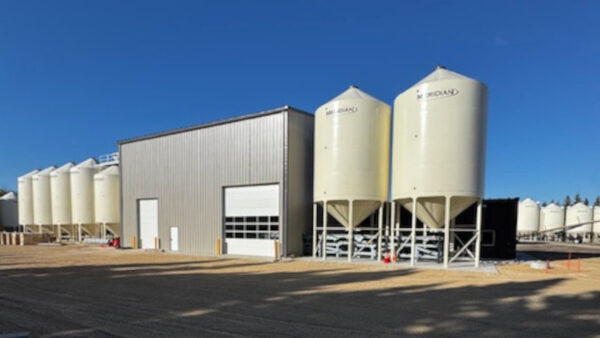
NATIONAL
FP GENETICS BRINGING NEW HYBRID TO WESTERN CANADA
FP Genetics has acquired one of the first viable hybrid cereals in Western Canada, Brasetto fall rye. Developed by KWS, an international seed company based in Germany, Brasetto is currently in the second year of testing in Canada. In its first year of testing, Brasetto showed a yield increase 25 per cent higher than the current highest yielding fall rye in Western Canada. Brasetto will be submitted for interim Canadian registration in February 2014, with full registration expected in February 2015. This would enable certified seed production to commence in the fall of 2014 with sales starting in 2015.
CDC FALCON MOVES TO CWGP CLASS IN 2014
Effective Aug. 1, 2014, the Canada Western Red Winter variety CDC Falcon will move to the Canada Western General Purpose class. Based on consultation with a broad representation of industry members, the Canadian Grain Commission has determined that there are sufficient supplies available for those producers who would like seed replacement varieties this fall. CDC Falcon will continue to be a registered variety, but as of next August, it can only be delivered into the CWGP class. Producers should consult the CGC’s variety designation lists to verify which class their wheat varieties are eligible for.
CROPINSPECT.CA
CropInspect has been founded by AgCall in alliance with 20/20 Seed Labs to provide unbiased, dependable seed crop inspection services to seed growers and seed companies. Beginning in 2014, CropInspect will provide inspection services to individual seed growers and seed companies through seed crop inspectors who will be licensed and audited by the Canadian Food Inspection Agency. AgCall will be licensed by the CFIA as an authorized seed crop inspection service. The alliance between AgCall and 20/20 was developed to provide a dependable third-party crop inspection service that is in the best interests of seed growers and the pedigreed seed industry.
COEXISTENCE PLAN FOR ALFALFA HAY IN EASTERN CANADA
After almost a year of work by stakeholders along the alfalfa hay production chain in Eastern Canada, a coexistence plan for alfalfa hay has been developed as a proactive measure to help prepare farmers should a decision be made to commercialize genetically modified alfalfa for hay production in Eastern Canada. A key outcome of this plan is the establishment of a set of suggestions for best management practices to allow all alfalfa hay production systems to be successful.
While the process was facilitated by the Canadian Seed Trade Association, the fundamentals of the coexistence plan were developed by a value chain group which included academics, forage specialists, and alfalfa producers and their customers. The group reviewed and researched alfalfa hay production systems and the biology of alfalfa in Canada and the result is a comprehensive, science-based document, which includes suggested best management practices for farmers. The BMPs are simple and practical and were developed based on a thorough assessment of alfalfa production and biology in Eastern Canada.
Based on several key principles that can help all alfalfa hay production systems to be successful, the coexistence plan gives producers the choice to pursue many opportunities in diverse domestic and international markets. The coexistence plan does not advocate for or against the commercialization of GM alfalfa. Nor does it favour one production system over the other. The plan strives to anticipate the future and identify practical and clear practices that can help all hay production systems to be successful in Eastern Canada. This will require good communication and mutual respect between neighbours who choose different production approaches, whether it be organic, conventional or through biotechnology.
INTERNATIONAL
CANADA/U.S. PERIMETER APPROACH TO PLANT PROTECTION
As part of the Canada-United States Regulatory Cooperation Council, the Canadian Food Inspection Agency and United States Animal and Plant Health Inspection Service are seeking feedback from stakeholders on the draft Canada-United States Perimeter Approach to Plant Protection framework document. The framework proposes details on how the two government agencies can work together on regulatory co-operation and align regulatory policies where possible for the safe and efficient trade in plants and plant products between Canada and the United States.
Under the framework, the CFIA and APHIS will identify and prioritize issues of mutual concern that could benefit from closer regulatory co-operation or alignment of regulatory policies. Both agencies are asking plant health stakeholders for input. In particular, the agencies are asking for views on the proposed framework, the role of stakeholders in the process, and issues that could benefit from closer Canada-U.S. regulatory co-operation. APHIS and the CFIA will share and consider all comments received and revise the draft framework as appropriate. The Steering Committee will meet later this year to finalize the framework and to determine projects and priorities for 2014.
BASF DISAGREES WITH EC RESTRICTION
BASF has expressed its disagreement with the European Commission’s latest decision to apply a two-year restriction on selected seed treatment uses of the insecticide fipronil. This will limit growers’ access to valuable and approved technologies. Along with many experts, BASF remains convinced that the decline in bee populations is caused by multiple and complex factors and that the restriction of fipronil will not contribute to protecting bees. “We will support the EC in the development of extensive measures that can benefit bees while securing food production in Europe. We do not believe that the planned restriction of fipronil uses will accomplish that,” says Jürgen Oldeweme, senior vice-president of global product safety and regulatory affairs with BASF Crop Protection.
SYNGENTA RECEIVES KOREAN IMPORT APPROVAL
Syngenta has announced regulatory authorities in Korea have granted import approval for the Agrisure 3122 trait stack for food or feed use. The Agrisure 3122 trait stack offers growers a reduced refuge trait stack featuring dual modes of action against corn borer and corn rootworm. “U.S. corn growers planting hybrids with Agrisure 3122 trait stack continue to gain access to additional export markets with Korean approval,” says David Morgan, regional director of Syngenta in North America and president of Syngenta Seeds Inc. “A trait stack featuring dual modes of action for both corn borer and corn rootworm offers U.S. corn growers the benefit of greater productivity through reduced refuge. Syngenta has received import approval from regulatory authorities in Canada, Japan, Mexico, Korea, the Philippines and Taiwan.
DAS AND MEIJI SEIKA SIGN EXCLUSIVE AGREEMENT
Meiji Seika Pharma Co. Ltd. and Dow AgroSciences have signed an agreement for the co-development and commercialization of a new fungicide within a new class of chemistry for agricultural use in the companies’ respective marketing territories. The Meiji territory includes Japan, South Korea as well as other Asian countries, while DAS will market the product in every other region around the world. The fungicide has potential use applications in cereals, vegetables, and fruits and ornamentals, and has shown to be effective as a foliar treatment. DAS intends to apply for regulatory approval in the EU in 2014, with commercial launch expected in 2019. Meiji will apply for regulatory approval in Japan in 2015.










